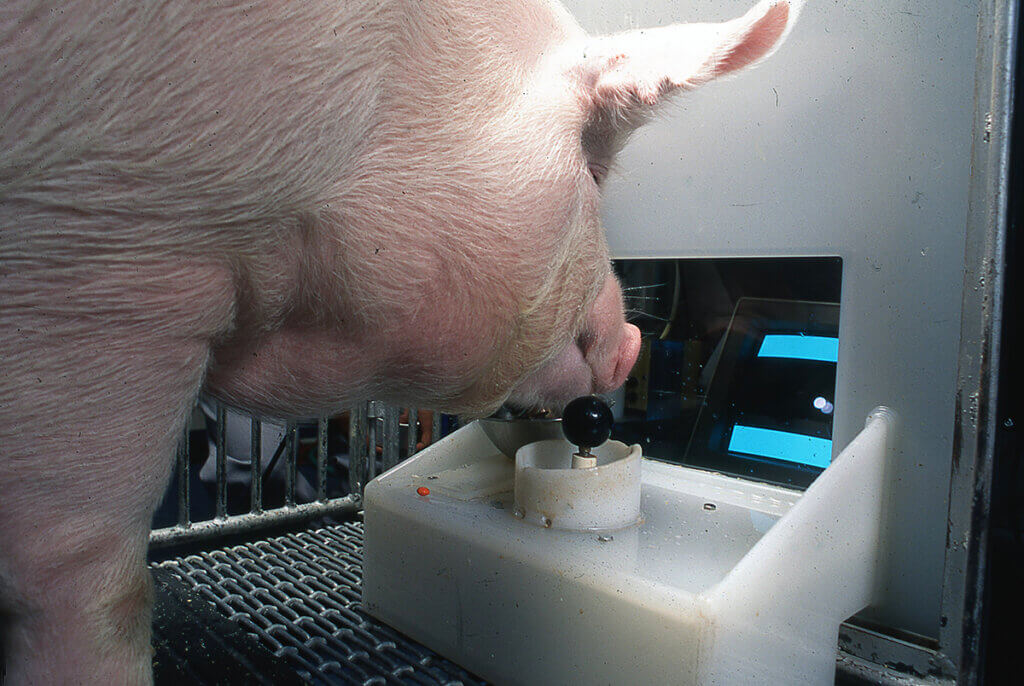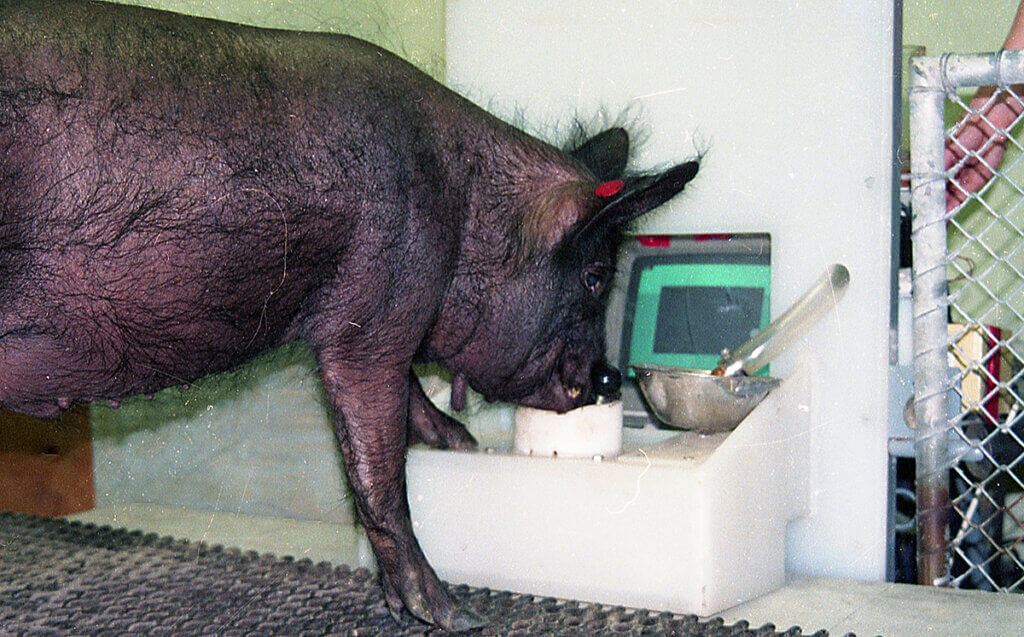The idea of pigs playing video games might seem like something that only would happen “…when pigs fly.” But think again, because research has shown pigs are a lot smarter than you might expect.
Over the past two decades studies of the intelligence of farm animals have greatly expanded. Among these animals, pigs are frequently reported to be quite smart and adaptable, with scientists confirming that pigs have been able to perform complex tasks despite their limited dexterity and other motor characteristics.
Dr. Candace Croney, director of the Center for Animal Welfare Science at Purdue University, has done extensive research on pig behavior. One such study conducted a number of years ago while she was at Pennsylvania State University, sought to take the research to the next level by introducing pigs to the gaming world. Recently the study data were reanalyzed and published in the journal Frontiers in Psychology, drawing extensive interest from media internationally.

A professor of animal behavior and well-being with a joint appointment in the Purdue University College of Veterinary Medicine and the College of Agriculture, Dr. Croney explained that the video game used in the study was a relatively simple training task initially designed for comparative cognition studies of non-human primates. The research team used the NASA/LRC computerized test system, which included an IBM 386 computer with a 33 cm color monitor. The pigs used a joystick to hit targets that would appear as borders along the edges of the screen. If the pigs were able to do easier stages of the task successfully then the game would become more challenging. The initial four target walls generated around the screen would be reduced to three, then two, then one and ultimately, became a small, moving box. Target locations were randomly generated and errors were recorded by the computer if the pigs made contact with any wall that was no longer a target. Finding that all pigs performed significantly above chance at making correct responses on the most difficult phase of the task indicated that they understood that the movement of the joystick they were utilizing controlled the movement of the objects on the screens. Making the conceptual leap that the object they were acting on was controlling the movement of a different two-dimensional object located elsewhere showed that they have cognitive capabilities and behavioral flexibility far beyond simple stimulus-response learning, involved in obeying basic commands such as “sit” and “stay” or just pressing a button or rooting at a joystick to get a reward.
Dr. Croney said with the use of not only food, but also positive social interactions, the pigs’ success in playing the games increased exponentially. “Well, you know, they’re pigs and so they are food motivated,” said Dr. Croney. “So we definitely used treats. One of the things that we did also use very effectively was just positive social interactions with them, petting, verbal reinforcement. All those seem to be really motivating to them, and frankly, sometimes even more motivating than food, particularly when things got frustrating for them.”
Four pigs participated in the study, two of which were Yorkshire pigs named Hamlet and Omelet while the other two were Panepinto micro pigs named Ebony and Ivory. Hamlet and Omelet scored 80% and 74% correct responses, respectively, on three-walled targets and 78% and 70% correct responses on the two-walled targets. Performance on the one-walled targets was less successful with a score of 48% for Hamlet and 42% for Omelet.

As for Ebony and Ivory, they both scored 84% on the three-walled tests. Their scores on the two-walled tests were 68% and 56%, respectively, while their scores on the one-walled tests were 34% and 76%. Omelette unfortunately developed health issues and had to be euthanized shortly after the study ended, while Hamlet lived the remainder of his life on a bed and breakfast farm and Ebony and Ivory spent the rest of their days at a children’s zoo.
“While our pigs were nowhere near as competent as monkeys and chimpanzees, what’s really cool is that they could do the task to any degree,” Dr. Croney said. “And that they were actually able to overcome the major conceptual hurdle of understanding that their manipulation of the joystick was having an effect elsewhere, and that controlling that effect is what elicited a reward is the thing that I find really remarkable.”
This study was funded by the Pennsylvania Agricultural Experiment Station, in addition to grants provided by USDA Cooperative Agreement 58-3602-5-143, Genex, the National Pork Producers Council; and the Pennsylvania Pork Producers Council.
Since the publication of the reanalyzed study last month, media across the globe have spotlighted the study including the BBC, CNN, U.S. News, CNET, The Smithsonian Magazine, Daily Mail, HuffPost, the Guardian, The Times and more, including numerous gamer sites. Click here to watch a recent BBC news clip on the study.
While people have particularly enjoyed the idea that pigs can be gamers, the purpose of the work was to explore objective methods of assessing the cognitive abilities of pigs, and to consider these in the context of pig ethology, comparative psychology, animal welfare, and ethics. Though this particular study involving pigs learning to play video games isn’t ongoing, Dr. Croney and her team are in the early stages of exploring options to revisit and develop new efforts in this area in collaboration with other groups. Because the joystick interface limited the degree to which the pigs could demonstrate their grasp of key concepts, Dr. Croney’s team followed up with studies using live objects – a process they actually would have done utilizing the computer if they been able to go further with the original group of pigs. They have since studied the degree to which the micro pigs could demonstrate understanding of concepts like “sameness” and that paper is expected to be published next.
